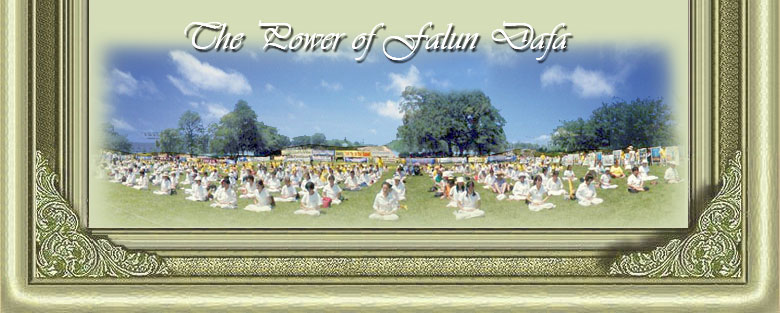|
By a Western practitioner in the U.S.
I have been a Falun Gong practitioner since late June, 1999. At that time I had already been doing the exercises for about three months but was also practicing Tibetan Buddhism. After listening to the nine-day lecture series, though, I struggled for a short time and decided to
finally commit myself to just practicing Falun Dafa. I knew that I had been making no progress in cultivation up to that point. In looking back, although I'm still working towards becoming a better person and have a very long way to go, I have made certain progress in that direction.
I'm a second generation American, of mixed Polish and Russian-German ancestry. Although my family were non-practicing Catholics and Protestants, they instilled Christian concepts in me by clearly distinguishing what was right and wrong. Each of them had been raised by very religious mothers. Despite or because of my parents' humble backgrounds, growing up here during the Depression, they wanted their children to succeed in the material world, and so they considered doing well in school extremely important. As a child, I learned to compete for grades by the time I was in high school. At the same time, I had sense enough to be embarrassed by my own need to be the best. To compensate, I became not only good in school, but also good at analyzing my own faults (and others') and good at seeming like a wonderful person. I was very cheerful and helpful. I had a very altruistic point of view. By the time I was in graduate school, I had convinced many people of my goodness and certainly had convinced myself.
For this reason, practicing cultivation was hard for me. I was complacent with my life. I had always been treated well by others. Although my graduate studies added tremendous stress to my life, I was learning and intellectually stimulated. Although my husband and I worried about money, still he had a job and my stipend added a little to that, so that we always managed to pay the rent, eat and take care of our bills. I had many friends with whom I could indulge in gossip and good times. My life was good.
After finishing my comprehensive exams, my husband and I moved to Kansas City, where he found a better paying and more challenging job. I settled down to part-time work and to writing my dissertation. My contact with friends diminished, and the stimulating challenge of new projects and ideas did too. I still had a very optimistic attitude about life and progress because I considered the time in Kansas City as a stop-over on the way to something either more exciting or more familiar. At the same time, I began to reassess my progress as a cultivator.
Master Li gives us so much help that, after listening to the lectures for the
first time, I felt like a different person. I could refrain from sarcasm when my husband got angry with me. I could monitor my own behavior more easily. And I literally could see the world in brighter colors.
As my cultivation began in earnest, I started on a tearful tour of realizing what I had become. For months, usually during the sitting meditation, I would have realizations that led me to cry. More accurately I would bawl. I would cry so hard that I'd get tired from it. I did not cry out of compassion for others. I cried out for all the bad things I had done. I cried when I realized that I'd been living a lie! that I had created an image of a wonderful and wise and loving person to show the world. I cried when I realized how kindly other people had treated me throughout my life. My parents tried to give me everything I wanted. My husband sacrificed years of his life in a job he hated in order to put me through school. I had often returned their kindness with smug indifference. I cried over and over again at my deeply embedded tendency to showing off. It seemed that everything I said was meant to show off in some way. I would be introduced to a new person, for example, and I would mention that I was working on my Ph.D. (As if they needed that piece of information!) While teaching my acting class (my studies are in theatre) and asking my students to sing a prepared piece of musical theatre, I managed to slip in a few bars of my own (as if I needed to impress junior high
scholars with my talents). All of these little events made me thoroughly unhappy with myself. This may not sound like a good way to be, but these feelings of remorse helped me considerably. I saw myself more truthfully and would vow never to show off again! until the next opportunity arose, and I would hear another inappropriate comment escape my lips. I battled and cried for three months in this way, and now I spend less time justifying my inconsiderate or self-interested behavior. I am beginning to recover some of the depth I had lost to glibness over the years. I have recovered some of the integrity instilled by my father and the compassion I had felt as a young child.
Some practitioners seem to have come from a past of despair or tortuous illness. I did not. I came from the other side and had to get past the easy world I had made for myself.
Today, I'm still struggling to become a better person. Nonetheless, what could be more precious than that struggle?
|



